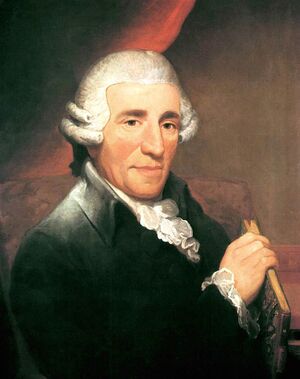Joseph Haydn
Austrian composer (b. 31 March 1732 [N.S.] at Rohrau; d. 31 May 1809 [N.S.] in Vienna), born Franz Joseph Haydn.
Tchaikovsky and Haydn
As Herman Laroche emphasized in the Foreword to his 1898 edition of his late friend's music review articles, Haydn was not one of Tchaikovsky's favourite composers. Nevertheless, Laroche added, it was characteristic of Tchaikovsky's firm conviction about the importance of German classical music that he should have recommended the board of directors of the Russian Musical Society to feature as many of Haydn's string quartets as possible in the concerts it organized. Tchaikovsky was certainly familiar with a fair amount of Haydn's prolific output, as during his years at the Saint Petersburg Conservatory he had played the flute in the student orchestra, and Haydn symphonies were frequently on the repertoire. Even in later years he would sometimes play through Haydn's works on the piano. However, despite all the respect he felt for Haydn's vital contribution to the development of classical music and his hard-working ethos, there was not enough warmth and content in his works, as Tchaikovsky saw it (see the references listed below). In the obituary which Laroche published shortly after Tchaikovsky's death, he noted how, notwithstanding his love of the eighteenth century in general, "[Tchaikovsky's] archaic tastes did not extend to the music of that age. With the exception of Mozart, whom he had loved ever since his youth and to whom he remained faithful right to the very end, and quite possibly Haydn, too, who interested him in patches, he was indifferent to all music before Beethoven..." [1]. Taking Beethoven as his bench-mark (as Tchaikovsky frequently did), there was not so much in "good old" Haydn's music that could stand such a comparison.
Arrangements by Tchaikovsky
- Gott Erhalte Franz den Kaiser (1874) — arrangement of Haydn's music for the Austrian National Anthem (1797).
General Reflections on Haydn
Bold references indicate particularly detailed or interesting references.
In Tchaikovsky's Music Review Articles
- TH 266 — Tchaikovsky calls Haydn the "father of all contemporary music", emphasizes how he had devoted his finest energies to chamber music, and after hearing a "delightfully naïve and cheerful" string quartet by him exhorts the Russian Musical Society to feature as many of Haydn's quartets as possible in its concert programmes.
- TH 270 — lists Haydn together with Bach, Mozart, Beethoven, Mendelssohn, Schumann, and Glinka as examples of the type of "hard-working artist" who concentrated on his music rather than seeking to draw attention to himself by championing various "theories" or causes (as in the case of Wagner).
- TH 276 — discusses the "invaluable historical services" which "the jovial old Haydn" had rendered for the development of symphonic and chamber music, paving the way for Mozart and Beethoven; but points out the "slickness and elegant coldness" of his music, which never moved one as profoundly as that of the following generations of composers. Nevertheless, Tchaikovsky insists that Haydn's "nice and pretty" music ought to be played more often in the Russian Musical Society concerts.
- TH 298 — referring to an unspecified symphony in G major by Haydn, Tchaikovsky calls it "an ancient but still splendid piece of music!"
In Tchaikovsky's Letters
- Letter 3675 to Grand Duke Konstantin Konstantinovich, 21 September/3 October 1888, in which Tchaikovsky discusses, amongst other things, how it was quite impossible to accuse Beethoven of prolixity, even in his late string quartets:
Just ask some people who are particularly familiar with these quartets (for example, the members of some regularly playing chamber music ensemble) whether they can find anything superfluous in Beethoven's C-sharp minor quartet [Op.131]. Almost certainly any such musician, unless he happened to be an old man who was brought up on Haydn, would be horrified if you suggested that he should cut or leave out anything […] Yes, it goes without saying that the classical beauty of the masters who came before Beethoven and their skill in the art of sich beschränken zu wissen ["knowing how to restrain oneself"'] are of a tremendous value. But it must also be said that Haydn had no need to restrain himself because God knows! he really didn't have that much material anyway…
- Letter 4149 to Modest Tchaikovsky, 15/27 June 1890:
It's costing me an incredible effort to write this [the string sextet Souvenir de Florence]; what's so difficult for me is not the lack of ideas but the novelty of the form. It requires six independent yet at the same time homogenous voices. This is incredibly difficult. Haydn was never able to surmount this difficulty and invariably wrote all his chamber music for string quartet.
In Tchaikovsky's Diaries
- Diary entry for 20 September/2 October 1886, in which Tchaikovsky reflects mainly on his contrasting feelings for Mozart and Beethoven, but mentions Mozart's predecessors at the end:
I like a thing or two in Haydn's music. However, all these four big shots [i.e. Bach, Handel, Gluck, and Haydn] are amalgamated in Mozart. He that knows Mozart knows everything that was good about these four, since, being the greatest and most powerful of musical Creators, he [i.e. Mozart] did not disdain to take them under his wing, thereby saving them from oblivion. They are like rays which are submerged in the sun that Mozart is [2].
Views on Specific Works by Haydn
In Tchaikovsky's Music Review Articles
- Symphony No. 103 in E-flat major, Hob. I/103 (1795), "The Drumroll" — TH 276
External Links
Notes and References
- ↑ Quoted in Воспоминания о П. И. Чайковском (1980), p. 44.
- ↑ Quoted here from Дни и годы П. И. Чайковского. Летопись жизни и творчества (1940), p. 386.

